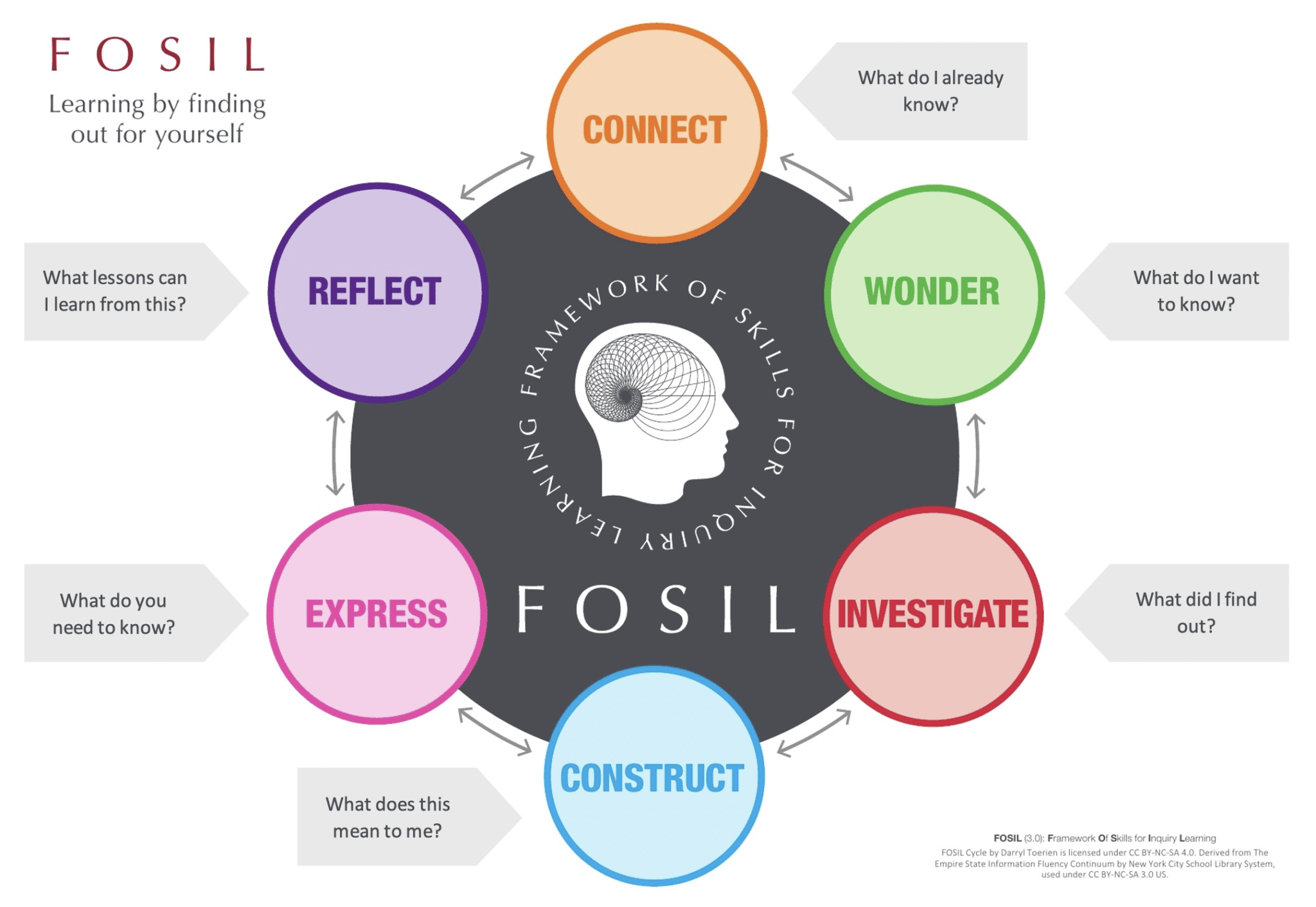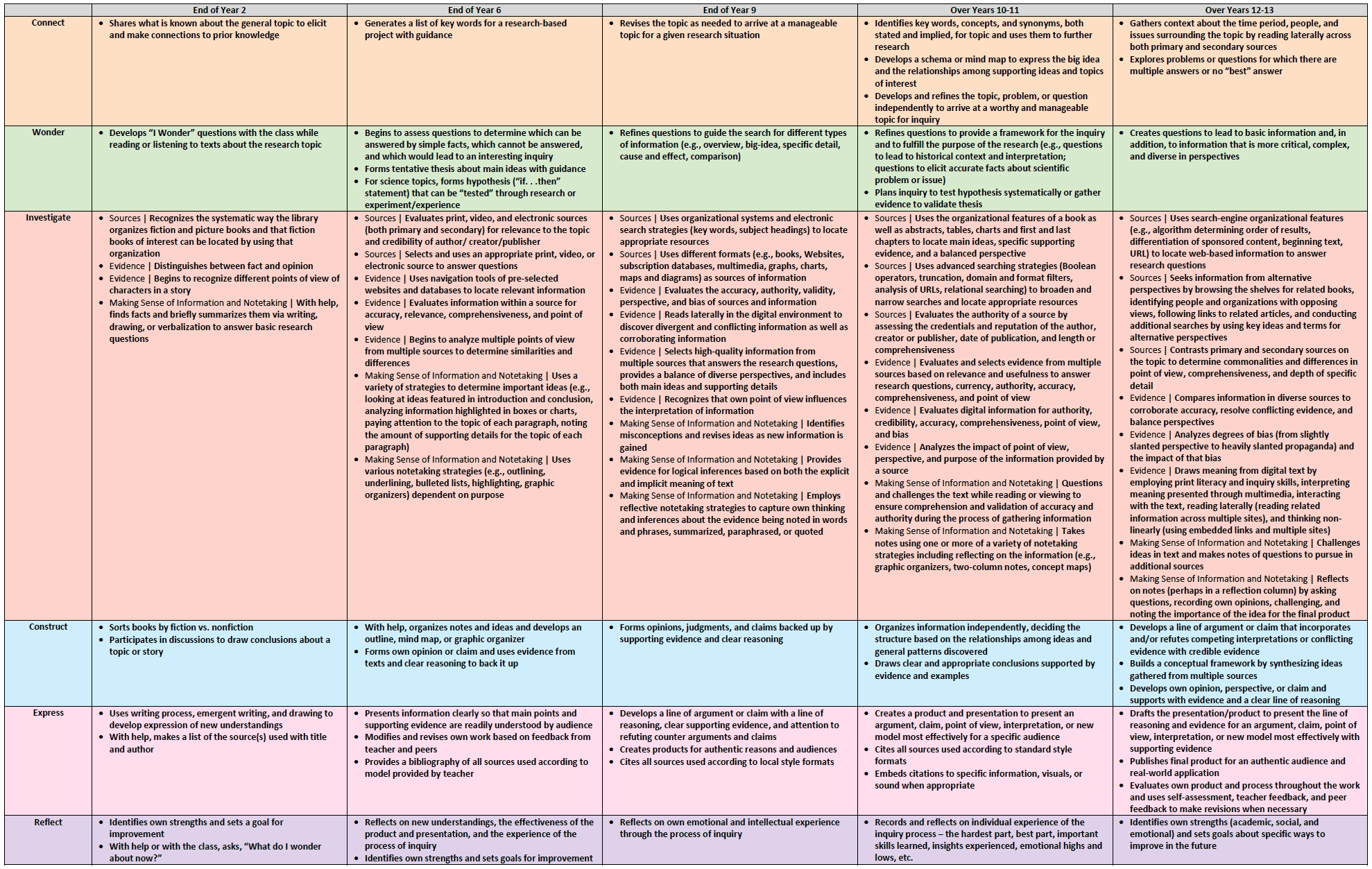FOSIL in Primary School
Home › Forums › The nature of inquiry and information literacy › FOSIL in Primary School
- This topic has 21 replies, 8 voices, and was last updated 3 years, 4 months ago by
 Darryl Toerien.
Darryl Toerien.
-
AuthorPosts
-
22nd March 2022 at 3:20 pm #78729
Hi Mary-Rose,
oh no, I’m definitely not further ahead with this at the moment! I have just joined a cross-College ‘Teaching and Learning Committee’ and we’re looking at ways to encourage independent learning across the school and I just immediately thought of FOSIL as I introduced Darryl talking about it at a YLG/SLA Conference a few years ago. I said that I would investigate FOSIL as a possible model for us to use from Nursery to Sixth Form and feed back to them so I’m putting together a little presentation. I’m going to use your fabulous Year 1 topic example because I found it much easier to understand and communicate in context. It’s also a good example to show that we can just ask teachers to look at existing topics then just make sure that they are hitting the priority skills in the way that it’s delivered and explored.
Another thing I’m involved in is ‘decolonising the curriculum’ which requires looking at what we teach, how we teach and encouraging different points of view and focus and I feel that an inquiry-based model fits this objective very well as it’s more focussed on developing the pupil as a learner who questions the world around them and is aware of themselves and others. Supporting our neuro-diverse learners is also something else that I am keen to incorporate into any new approach to learning. Some of the ‘Executive Skills’ that our neuro-diverse pupils in particular can find challenging would be directly taught and reflected upon from an early age using the FOSIL model (e.g. planning, time management, organisation of ideas, metacognition) whilst also empowering them as independent learners.
I showed your Year 1 example to our Pre-Prep Librarian and she absolutely loved the way that you have presented the books visually by the way. Would you mind me asking how you did it? The drop shadow effect is lovely!
Thanks
Jenny
10th April 2022 at 2:24 pm #78834This sounds fascinating Jenny! Have you found the presentations already created around using FOSIL here…
It would be great to have an update once you are done.
Best Wishes
Elizabeth
13th June 2022 at 3:59 pm #79008After much thought, and consultation with Barbara Stripling, we have developed a simplified version of the FOSIL Inquiry Cycle for use with younger students (see below), which may be downloaded as a PDF and/ or PNG.
While the descriptions of the stages have been simplified, I have now used this version of the Cycle twice with younger students and am confident that the wording accurately describes the learning stance, process and development (see FOSIL Cycle for a detailed description of the stages involved – note that each circle/ stage is a hyperlink to further information about that stage).
I will reflect on this further in due course.
This version of the Cycle has also been uploaded to Resources.
 29th August 2022 at 10:28 am #79079
29th August 2022 at 10:28 am #79079Hello Mary Rose,
I am a new member of FOSIL and currently teaching Kindergarten in Sydney Australia. As part of my research to become a Teacher Librarian, I came across the FOSIL inquiry model. I am very interested in learning more from the TL perspective. I have taught through inquiry using PYP and other models but FOSIL is of particular interest as it seems to value the TL role. Can I ask how you created the reading grid? I am designing a unit of inquiry for our children to explore force and motion and I want to embed the use of books in the unit. I really like the way you modelled that in your example. My TL always brings a box of related texts to my classroom at the beginning of a unit but as we do not collaborate in the process of designing the program it is true what J Jones says, I do not always use them with the class. So often I already have my own books in mind. As I move to the TL role, I hope to be more involved in planning with the teachers so that I am truly supporting the learning in the classroom.
6th September 2022 at 12:26 pm #79100Jenny – I am MORTIFIED that I have just seen this now; I cannot imagine how I missed it! This work has taken very much a back seat over the last few months for one reason and another… The grids were made in Publisher and I added the shadow that way. I will reply more in due course, but apologies for my silence!
6th September 2022 at 12:29 pm #79101Hello Clare. I created the grid in Publisher having first found the books amongst our own collection (although some are my own and ones I lend to the teachers). We have a long way to go to get this working in the way that we know it should… I need sixteen hands and twenty four more hours in the day I think! I will reply more fully in due course.
4th October 2022 at 10:19 am #79132Welcome, Clare, and I also look forward to Mary-Rose’s reply. I will also be very interested in how you go.
We have been at Blanchelande College for a year now. Blanchelande is a PK-12 school (age 2½ – 18), with five phases:
- Infants (PK-1 / Reception-Year 2)
- Juniors (Grade 2-5 / Year 3-6)
- Lower Seniors (Grade 6-8 / Year 7-9)
- Upper Seniors (Grade 9-10 / Year 10-11)
- Sixth Form (Grade 11-12 / Year 12-13)
Our goal for this year is to establish at least one Signature Work* in each phase, with the Signature Work in Year 9-10 bridging Lower and Upper Seniors. This gives us an opportunity to begin establishing FOSIL priority skills in each phase (see below / download as high resolution PNG), which is crucial for the systematic and progressive development of these skills.

Of interest to us here is how Signature Work will manifest in Infants, and I will update as soon as I have met with the Head of Infants.
Also of interest to us here is the year-long interdisciplinary Signature Work in Grade 5, which is already underway. I have a meeting on Thursday afternoon with all colleagues who will be involved, and I have created a topic for this – see Year 6 Interdisciplinary Inquiry.
Finally, I am pleased to share our implementation of the FOSIL Inquiry Cycle that was developed specifically for use in primary schools (see this post above), and which now appears in every teaching and learning space in the entire school:

* A Signature Work is an age-appropriate inquiry-based exploration of a significant issue, problem or question that the individual student identifies and defines, that is conducted over the course of at least one semester, and that involves substantial writing and reflection – based on the AAC&U‘s definition in What Liberal Education Looks Like: What It Is, Who It’s For and Where It Happens (2020). Signature Work is a defining feature of a liberal education.
-
AuthorPosts
- You must be logged in to reply to this topic.


